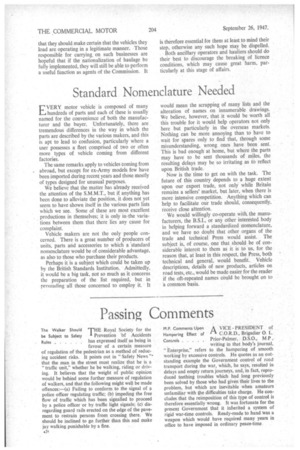Standard Nomenclature Needed
Page 28

If you've noticed an error in this article please click here to report it so we can fix it.
EVERY motor vehicle is composed of many hundreds of parts and each of these is usually named for the convenience of both the manufacturer and the buyer. Unfortunately, there are tremendous differences in the way in which the parts are described by the various makers, and this is apt to lead to confusion, particularly where a user possesses a fleet comprised of two or often more types of vehicle coming from different factories.
The same remarks apply to vehicles Coming from , abroad, but except for ex-Army models few have been imported during recent years and those mostly of types designed for unusual purposes.
We believe that the matter has already received the attention of the S.M.M.T., but if. anything has been done to alleviate the position, it does not yet seem to have shown itself in the various parts lists which we see. Some of these are most excellent productions in themselves; it is only in-the variations between them that there lies any cause for complaint.
Vehicle makers are not the only people concerned. There is a great number of producers of units, parts and accessories to which a 'standard nomenclature would be of considerable advantage, as also to those who purchase their products.
Perhaps it is a subject which could be taken up by the British Standards Institution. Admittedly, it would be a big task, not so much as it concerns the preparation of the list required, but in persuading all those concerned to employ it. It would mean the scrapping of many lists and the alteration of names on innumerable drawings. We believe, however, that it would be worth all this trouble for it would help operators not only here but particularly in the overseas markets. Nothing can be more annoying than to have to wait for spares only to find that, through some misunderstanding, wrong ones have been sent. This is bad enough at home, but where the parts may have to be sent thousands of miles, the resulting delays may be so irritating as to reflect upon British trade.
Now is the time to get on with the task. The future of this country depends to a huge extent upon our export trade, not only while Britain remains a sellers' market, but later, when there is more intensive competition. Anything which can help to facilitate our trade should, consequently, receive close attention.
We would willingly co-operate with, the manufacturers, the B.S.I., or any other interested body in helping forward a standardized nomenclature, and we have no doubt that other organs of the trade and technical Press would assist. The subject is, of course, one that should be of considerable interest to them as it is to us, for the reason that, at least in this respect, the Press, both technical and general, would benefit. Vehicle descriptions, details of new products, articles on road tests, etc., would be made easier for the reader if the oft-repeated names could be brought on to a common basis.




















































































